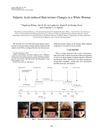Valproic acid
aka - valproate
Valproic acid, first made in 1881 used since 1962, is primarily known for its use as an anticonvulsant and mood-stabilizing drug, and has recently garnered attention in the field of dermatology for its potential effects on hair growth and alopecia treatment. Scientifically, valproic acid operates by increasing the levels of gamma-aminobutyric acid (GABA) in the brain, but its effects on hair growth are thought to be mediated through different pathways, possibly involving the inhibition of histone deacetylases (HDAC) which can influence gene expression beneficial for hair follicle health and activity.
Research has highlighted valproic acid's capacity to induce hair regeneration in both animal models and human dermal papilla cells by activating alkaline phosphatase activity—an enzyme associated with hair growth and follicle development. Studies indicate that valproic acid can promote hair growth by elongating the hair shaft and delaying the transition to the catagen (regression) phase, alongside promoting the anagen (growth) phase in vivo, providing a promising avenue for alopecia treatment.
The community's engagement with valproic acid reflects a keen interest in its utility for hair loss, with discussions often revolving around personal experiences and the exploration of valproic acid as a novel treatment. Community members share anecdotal evidence of its efficacy, particularly when used topically, noting improvements in hair density and growth. However, experiences vary, and while some individuals report positive outcomes, others call for more extensive research to conclusively determine its effectiveness and optimal application methods.
In summary, valproic acid presents a promising, albeit still under-researched, option for treating alopecia by potentially enhancing hair growth and follicle health through mechanisms distinct from its neurological effects. While initial research and community experiences offer hope, the call for further scientific investigation is clear to fully establish valproic acid's role in hair loss therapy.
Research
20 / 529 resultsresearch Valproic Acid: A Reappraisal of Its Pharmacological Properties and Clinical Efficacy in Epilepsy

research Valproic Acid Induces Hair Regeneration in Murine Model and Activates Alkaline Phosphatase Activity in Human Dermal Papilla Cells
research Low Serum Biotinidase Activity in Children with Valproic Acid Monotherapy
research Pancreatitis Associated With Valproic Acid Therapy for Epilepsy

research Transcutaneous Implantation of Valproic Acid-Encapsulated Dissolving Microneedles Induces Hair Regrowth

research Valproic Acid Promotes Human Hair Growth in In Vitro Culture Model

research Exploring the Drug Repurposing Versatility of Valproic Acid as a Multifunctional Regulator of Innate and Adaptive Immune Cells

research Topical Valproic Acid Increases Hair Count in Male Patients with Androgenetic Alopecia: A Randomized, Comparative, Clinical Feasibility Study Using Phototrichogram Analysis
research The Influence of Valproic Acid Treatment on Hair and Serum Zinc Levels and Serum Biotinidase Activity

research Valproic Acid Reduces Hair Loss and Improves Survival in Patients Receiving Temozolomide-Based Radiation Therapy for High-Grade Glioma
research Valproic Acid (Depakene)
research The Effects of Biotin Supplementation on Serum and Liver Tissue Biotinidase Enzyme Activity and Alopecia in Rats Treated with Valproic Acid

research The Influence of Valproic Acid and Carbamazepine Treatment on Serum Biotin and Zinc Levels and on Biotinidase Activity
research Valproic Acid in Childhood Epilepsy: Anticonvulsive Efficacy in Relation to Its Plasma Levels
research Serum Biotinidase Activity in Children Treated With Valproic Acid and Carbamazepine
research Valproic Acid Teratogenicity in Whole Embryo Culture Is Not Prevented by Zinc Supplementation
research Serum and Liver Tissue Biotinidase Enzyme Activity in Rats Administered Valproic Acid

research Risk of Valproic Acid-Related Alopecia: A Systematic Review and Meta-Analysis
